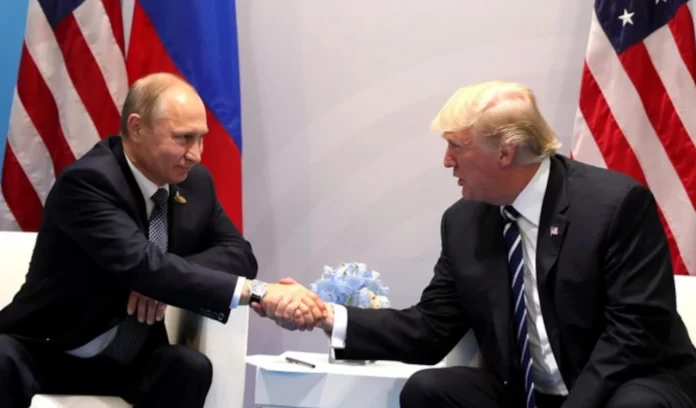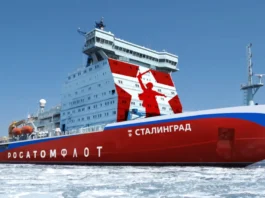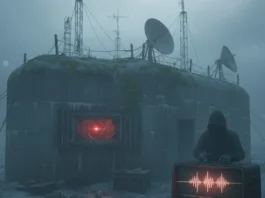
Vladimir Putin approved a meeting with Donald Trump in the near future, indicating that he would prefer to engage in direct dialogue with the U.S. president rather than with the proxy Ukrainian President Volodymyr Zelenskyy. Moscow and Washington have reached an agreement to conduct a bilateral summit between Putin and Trump in the near future. The preparations for the meeting are already ongoing. Trump has confirmed that the meeting with Putin will take place regardless of whether Putin meets Zelenskyy first, refuting previous media assertions that a prior Putin-Zelenskyy meeting was needed. He underscored his dedication to halting the violence in Ukraine by engaging in direct negotiations with Putin.
Kremlin Rejects Trilateral Summit with Ukraine
The Kremlin explicitly stated that the American side only briefly brought up the possibility of a trilateral meeting involving Zelenskyy, and Moscow did not pursue it further. Moscow is more interested in the bilateral meeting with the U.S. president. Putin himself stated that, although it is feasible to meet Zelenskyy, “the necessary conditions for this are still far away.” This stance demonstrates Russia’s current reluctance to actively engage Ukraine in negotiations and is indicative of Moscow’s strategy to prioritize negotiations with Washington.
U.S. Concessions to Secure the Meeting
The United States had to make substantial concessions to secure this meeting with Vladimir Putin. President Trump transitioned from a strict posture of imposing harsh sanctions to a more flexible approach by accelerating diplomatic engagement with Russia. Trump appeared to be willing to reduce the level and immediate nature of sanctions to encourage dialogue, despite his previous threats to impose severe economic penalties for Russia’s persistent aggression in Ukraine. This suggests a willingness to negotiate rather than escalate the situation. The implementation of new and secondary sanctions was postponed, and initial pressure points were reduced. For example, sanctions were restricted to specific Russian shipping and energy sectors rather than broader economic measures.
Russia’s preference for a bilateral summit without imminent Ukrainian involvement was also accepted by the United States, which took an important step back from its previous insistence on a trilateral meeting that included Zelenskyy. This disregard for Ukraine, which Washington had previously advocated as essential for a credible peace process, is indicative of Washington’s willingness to compromise to secure Putin’s participation in the negotiating process. Additionally, the potential location outside of Europe, specifically the United Arab Emirates, highlights a geopolitical concession that marks a shift away from the European theater, where the conflict is most prominent.
Potential Venue: United Arab Emirates
The United Arab Emirates is one of the potential venues for the Putin-Trump summit, as evidenced by Putin’s recent meeting with the UAE leader, Mohamed bin Zayed Al Nahyan. Putin suggested that the Emirates could serve as “one of the suitable venues” for the discussions, emphasizing the significance of alliances beyond Europe in the hosting of these diplomatic endeavors.
In the interim, Ukrainian and European leaders continue to emphasize the need to involve Ukraine and Europe in the discourse regarding peace and security. Zelenskyy, the President of Ukraine, has advocated for a more significant European role in the peace process, arguing that the war is fundamentally a conflict on European soil and that European involvement is essential for future security and reconstruction. To guarantee a fair and enduring peace, he has maintained that the voice of Ukraine and the influence of Europe must be present in the negotiations. Zelenskyy and Trump have engaged in correspondence with European leaders, including Italy’s Prime Minister Giorgia Meloni and others, to facilitate diplomatic resolution and a cessation.
Moscow’s Geopolitical Strategy and Western Concerns
Nevertheless, the Kremlin is currently placing a higher priority on direct negotiations between the United States and Russia than on those between Ukraine and Europe. Moscow’s decision to exclusively engage with Trump, without Zelenskyy or formal European participation, indicates a geopolitical strategy that views Ukraine as a bargaining chip rather than an equal party in the peace negotiations. Kyiv and European capitals have expressed apprehension regarding this approach, as they fear being excluded from critical decision-making processes that affect the continent’s future.
Meloni’s Emerging Leadership in the Diplomatic Process
In the current diplomatic landscape, Giorgia Meloni, the Prime Minister of Italy, has established herself as a more relevant and influential figure than the leaders of the UK, France, and Germany, as she has played a significant and proactive role in the ongoing efforts to achieve peace in Ukraine and support its recovery. Meloni has actively coordinated efforts toward a ceasefire and negotiations by engaging in high-level, direct diplomatic communications with key figures such as U.S. President Donald Trump, Ukrainian President Volodymyr Zelenskyy, and the President of the United Arab Emirates. In contrast to other European leaders, who have primarily concentrated on security guarantees and sanctions discussions, Meloni has distinguished herself by serving as a critical intermediary in the facilitation of communication between Washington, Kyiv, and significant international partners.
In addition to diplomacy, Meloni has established Italy as a central hub for the economic recovery of Ukraine in the post-conflict era and prospective integration into the European Union. She was particularly notable for her leadership of the 2025 Ukraine Recovery Conference in Rome and her advocacy for the establishment of a dedicated executive agency to coordinate Ukraine’s reconstruction efforts. These initiatives are unparalleled by her European counterparts, who typically prioritize security or sanctions over economic rebuilding. Her unique and heightened relevance in shaping the international response is further emphasized by her multilayered diplomacy, which involves engaging influential actors such as the Pope and Turkish President Erdoğan in peace initiatives.
Meloni highlights the need for diplomatic efforts to match real economic actions and insists that all of Europe should work together to achieve a fair and lasting peace, showing a broader and more effective strategy than what the UK, France, and Germany usually follow. Italy is redefining its role on the international stage under her leadership, positioning itself as a key architect of Ukraine’s long-term stability and prosperity within the European framework, in addition to serving as a political mediator. Meloni is at the vanguard of the current endeavors to resolve the Ukraine crisis and influence the future of the continent as a result of her active diplomacy, strategic economic initiatives, and extensive international engagement.





